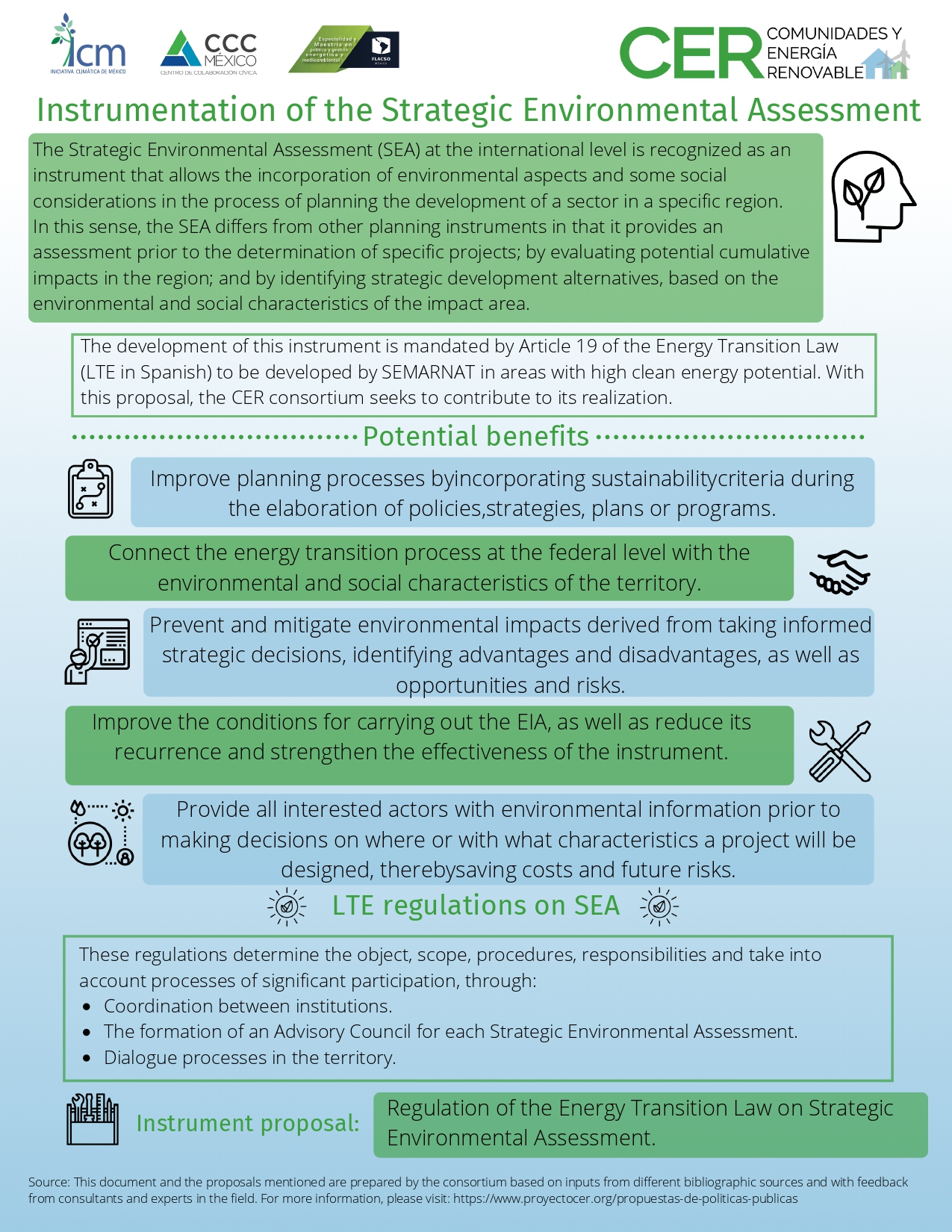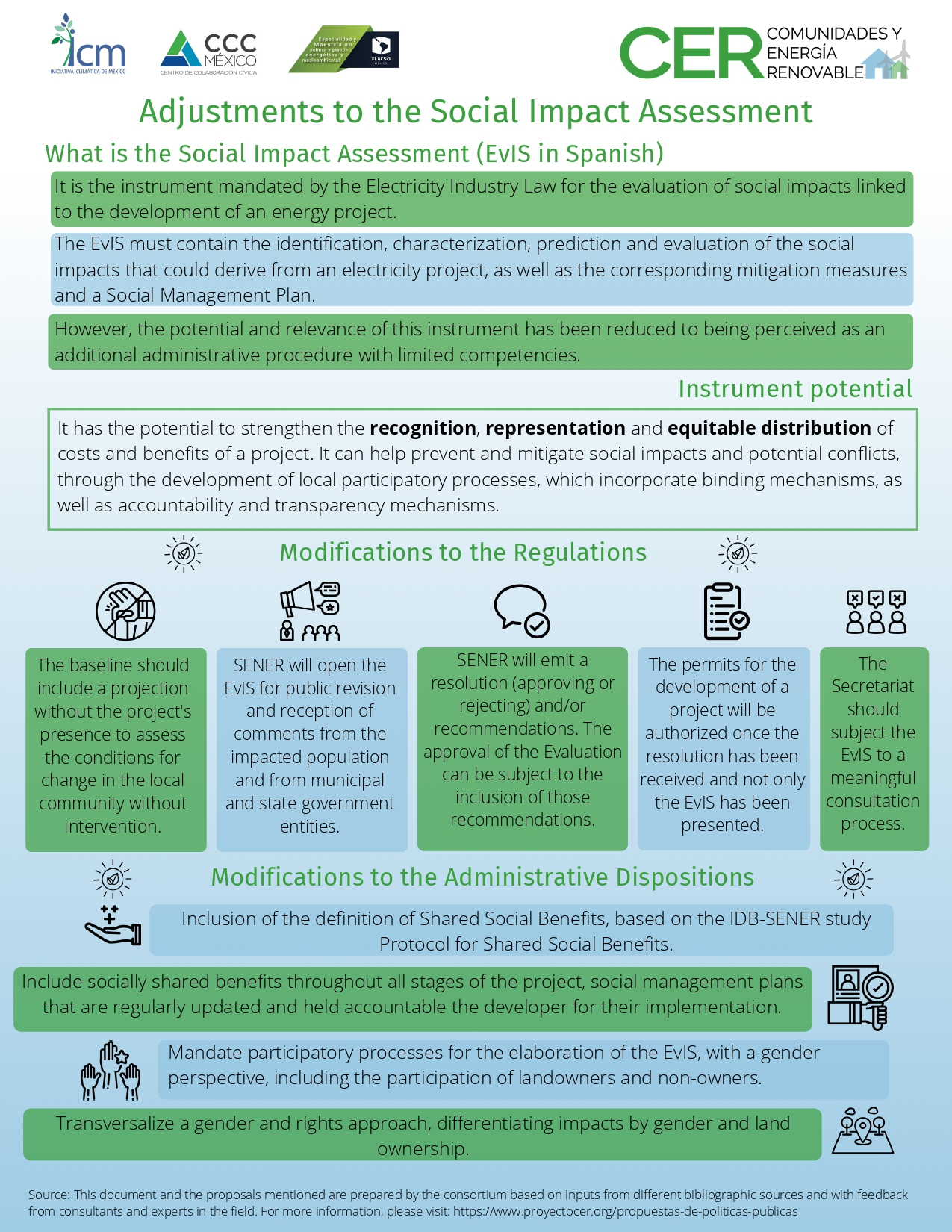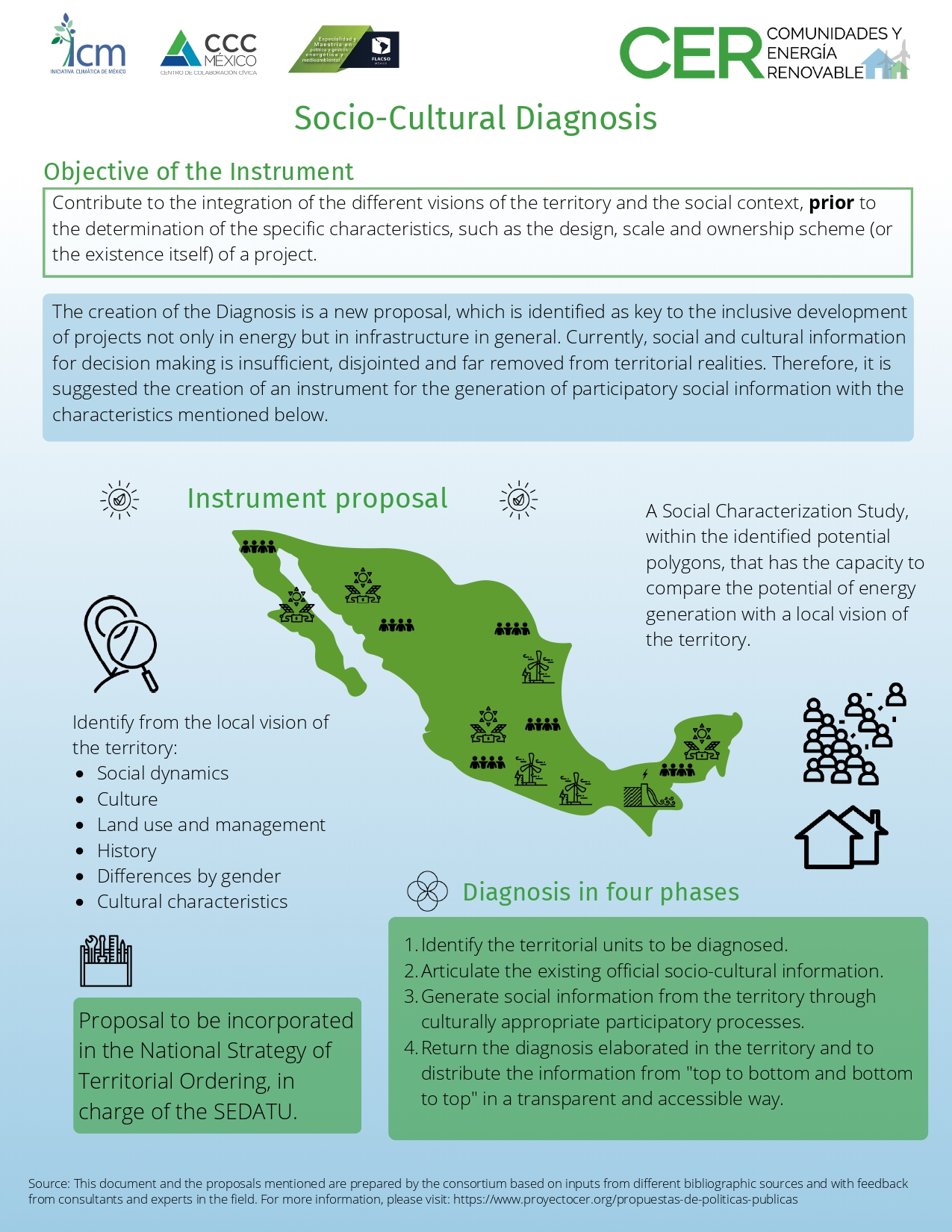PUBLIC
POLICIES PROPOSAL
CER has developed three public policy proposals that seek to contribute to the participatory, inclusive, and transparent development of renewable energy projects in Mexico. The proposals incorporate gender and human rights perspective and have the goals to prevent the emergence of social conflicts, increase the shared benefits among communities and mitigate the negative risks associated with the development of renewable energy projects.
Our proposals are as follows:
- Regulation of the Strategic Environmental Assessment.
- Modification to the regulatory framework of the Social Impact Assessment.
- Development of a Sociocultural Diagnosis of the Territory.
Below is presented a brief description of each proposal, a poster of it, and a link to the full version of each proposal in Spanish.
1. PROPOSAL FOR A REGULATION OF THE STRATEGIC ENVIRONMENTAL ASSESSMENT (SEA)
The Strategic Environmental Assessment (SEA) at the international level is recognized as an instrument for planning and managing regional policies, programs, and plans. This instrument allows the inclusion of environmental aspects and some social considerations into the planning process around the development of a sector in a specific region. In this sense, SEA distinguishes itself from other planning instruments by offering an ex-ante assessment to the determination of specific projects; also for evaluating accumulated impacts in the region; and because it identifies strategic development alternatives according to the environmental features and social aspects that characterize the region.
The elaboration of this instrument is mandated in Article 19 of the Energy Transition Law. This article mentions that the elaboration of the SEA is the responsibility of the Ministry of Environment (SEMARNAT) and this will be made on the polygons identified with high clean energy potential published by the Energy Ministry (SENER, the Spanish acronym). However, as of early 2020, (SEMARNAT) has not developed any SEA, nor does it have any regulations, provisions, or procedures to implement it. Considering this situation, the CER project has developed a proposal for the Energy Transition Regulation in the SEA. This proposal could be reviewed and adopted by SEMARNAT. The proposal highlights the relevance and benefits of implementing the SEA. Some of its benefits are the following:
- It improves the regional planning processes by incorporating sustainability criteria in the elaboration of policies, plans and programs.
- It prevents severe or irreversible impacts on the environment. Thus, it contributes to identifying strategic alternatives and assess risks in advance.
- It provides environmental information prior to the decision-making process that is valuable for all the stakeholders involved (SEMARNAT, the companies and communities interested in knowing the risks and opportunities associated to the development of projects within a sector).
- It enables the development of better Environmental Impact Assessment (EIA) since specific projects must be derived from a SEA analysis.
The proposed regulation, in addition to determining the object, scope, procedures and controls, includes aspects that the consortium has identified as key to the successful development of renewable energy. Some of them are:
- Determination of the carrying capacity of an ecosystem
- Institutional coordination
- The configuration of an Advisory Council for each SEA
- Dialogue processes in the territory

(Link to the full version of the proposal)
Share your opinion2. PROPOSAL FOR AMENDMENT TO THE NORMATIVE FRAMEWORK OF THE SOCIAL IMPACT ASSESSMENT (SIA)
The Social Impact Assessment (SIA) is the instrument defined in the Electricity Industry Law and the Hydrocarbons Law to be developed by the company or person interested in the implementation of an energy project. The SIA must be delivered to SENER and is an instrument of great relevance for decision-making since it is the only one in which the social components linked to the development of an electricity project are mentioned. The SIA must contain the identification, characterization, modification, and evaluation of the social impacts that could derive from an electricity project, as well as the corresponding mitigation measures and a Social Management Plan. This instrument has the potential to strengthen the recognition, representation and equitable distribution of costs and benefits of a project. However, the potential and relevance of this instrument have been reduced to being perceived as just another administrative procedure, with very limited scope.
In this respect, in the framework of the research work of CER, the SIA has been identified as a document that can contribute to preventing and mitigating social impacts and possible conflicts, through the development of local participatory processes, which incorporate binding mechanisms, for example in the approval of SIA by SENER, as well as accountability and transparency mechanisms. For this reason, a proposal to modify the regulatory framework of the SIA (Regulation of the Law of the Electric Industry) that addresses the following points is specified:
- Permits for the development of a project will be necessary once the EvIS requirements have been approved and not submitted.
- SENER will resolve, or give conditioning recommendations for its subsequent resolution.
- The baseline should include a scenario without the presence of the project to assess the conditions of change in the community without intervention.
- SENER will make the SIA public to receive comments from the impacted population and from municipal and governmental entities.
Likewise, the administrative provisions of the SIA were modified, which includes, among other aspects, the following:
- Include and define Shared Social Benefits, based on the IDB-SENER Protocol for Socially Shared Benefits.
- That the Shared Social Benefits are included throughout the stages of the project, reviewed periodically and that the report is accountable for its implementation.
- Include participatory processes in the preparation of the SIA, with a gender focus, which includes the participation of landowners and non-owners of the land.

(Link to the preliminary version of the proposal)
Share your opinion3. PROPOSAL FOR THE ELABORATION OF A TERRITORY SOCIO-CULTURAL DIAGNOSIS (TSCD)
This proposal, in contrast to SIA and SEA, is not a mandate by law, nor is it the responsibility for its preparation assigned to a specific government department. The proposal to prepare a Sociocultural Diagnosis of the Territory (TSCD) is derived from the results obtained from the participatory diagnoses in three states, work with communities, outcomes of the Diploma, as well as interviews with key stakeholders that allowed us to identify that the social and cultural information about the territory for decision-making is currently insufficient, it is delinked and far from territorial realities.
Therefore, a diagnosis was created that integrates different visions and social and cultural factors linked to the territory, which contribute to comprehensive, participatory planning and evaluation prior to the development of renewable energy and infrastructure projects. What makes the TSCD an essential instrument for territorial planning.
The preparation of the proposed diagnosis comprises four main phases:
- The identification of the territorial units of analysis.
- The articulation of existing official socio-cultural information (INEGI, CONEVAL, CONAPO, INPI, SEGOB, SEMARNAT, SADER, Secretaria de Bienestar, SEDATU, among other institutions).
- Generate social information from the territory through culturally specific participatory processes.
- Socialize the diagnosis made in the territory with the local communities. In other words, distribute information "top-down and bottom-up", in a transparent and accessible way. In such a way that not only information on the territory is collected, but the information is shared about the potential alternative uses of their land (for example, the potential for generating energy through renewable sources).

(Link to the preliminary version of the proposal)
Share your opinion
